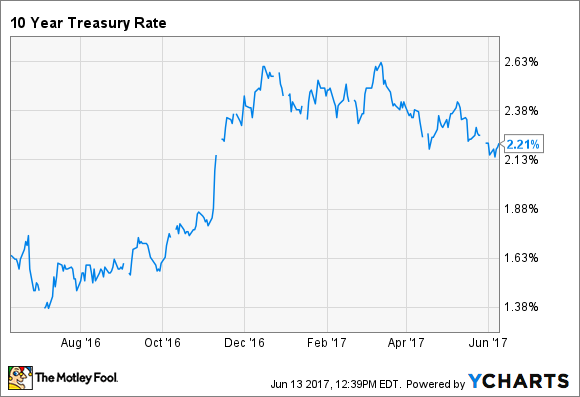With interest rates on the rise and the regulatory burden in the financial services sector on the decline, investors are right to be optimistic about JPMorgan Chase's (JPM 0.17%) second-quarter performance, which will be announced in the middle of next month. Yet, in the past week, one high-profile analyst has lowered his expectations for JPMorgan's earnings for the three months ending June 30.
In a recent note to clients, Keefe, Bruyette & Woods' Brian Kleinhanzl said that he now expects JPMorgan Chase to earn $1.57 per share in the second quarter. That's down from his previous estimate of $1.69 per share.

JPMorgan Chase Chairman and CEO Jamie Dimon. Image source: JPMorgan Chase.
Kleinhanzl cited a number of reasons for the downgrade, but the most important is an expected drop in trading revenue. "Market volatility has fallen off after first-quarter results were announced and we expect the environment to remain subdued through quarter-end," wrote Kleinhanzl. "As a result, we are updating our trading revenue forecast to reflect lower volatility and lower market activity."
As a universal bank, with both commercial and investment banking operations, JPMorgan Chase earns a substantial amount of revenue each quarter from trading equities and fixed-income securities. In the first three months of the year, the nation's biggest bank by assets generated $5.8 billion in trading-related income. But with volatility unusually low right now, combined with a seasonal drop in trading volumes in the summer months, this figure is expected to fall.
Kleinhanzl also noted that a recent decline in long-term interest rates could impact big banks' bottom lines as well. The yield on 10-year Treasury bonds, the primary long-term interest rate benchmark in the United States, has dropped from a peak of approximately 2.6% earlier this year down to 2.2% currently. Because this reduces the yield on a bank's loan and securities portfolios, it translates into lower revenue and earnings.
10 Year Treasury Rate data by YCharts.
As Kleinhanzl wrote:
We have lowered [net interest income] estimates in 2Q17 for lower long-term rates versus our previous expectations. The 10-year treasury rate has averaged 2.28% thus far quarter to date and this is below our original forecast of 2.65%. Lower long-term rates weighed on earnings revisions and we believe lower rates have also contributed to the underperformance in Universal bank stocks versus the broader market this year -- flat versus up 8.5% for the S&P 500.
The good news is that, despite these expected headwinds, KBW expects JPMorgan Chase and other universal bank stocks to outperform the broader market. They trade at around 66% of the average price-to-earnings multiple on the S&P 500. Moreover, with the Federal Reserve seemingly set to increase short-term rates this week, and with the results of this year's stress tests due out at the end of this month, there are plenty of reasons for bank stock investors to be optimistic.
This doesn't necessarily mean that you should buy JPMorgan Chase's stock right now. Much of the expected good news is presumably already baked into the New York-based bank's stock. In addition, the turmoil in the nation's capital, combined with the unfolding legislative paralysis in Congress and the market's already lofty valuation, could easily lead one to conclude that there's more to gain than to lose by waiting for a potential pullback before diving further into the market.






